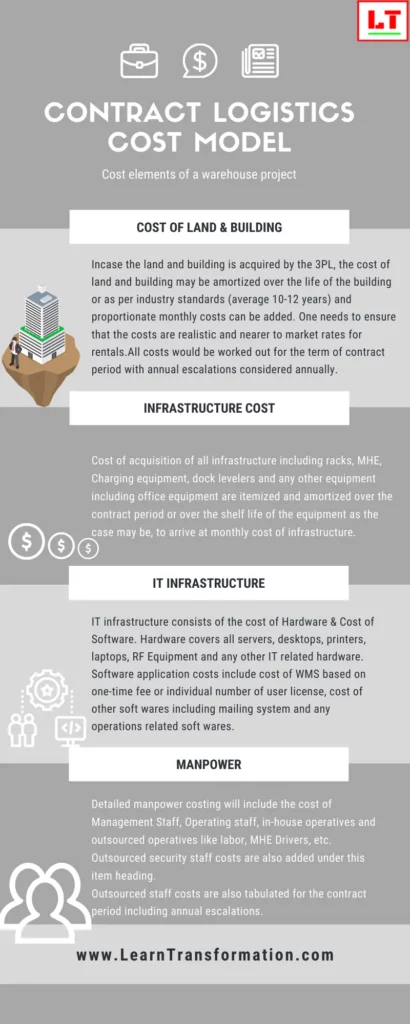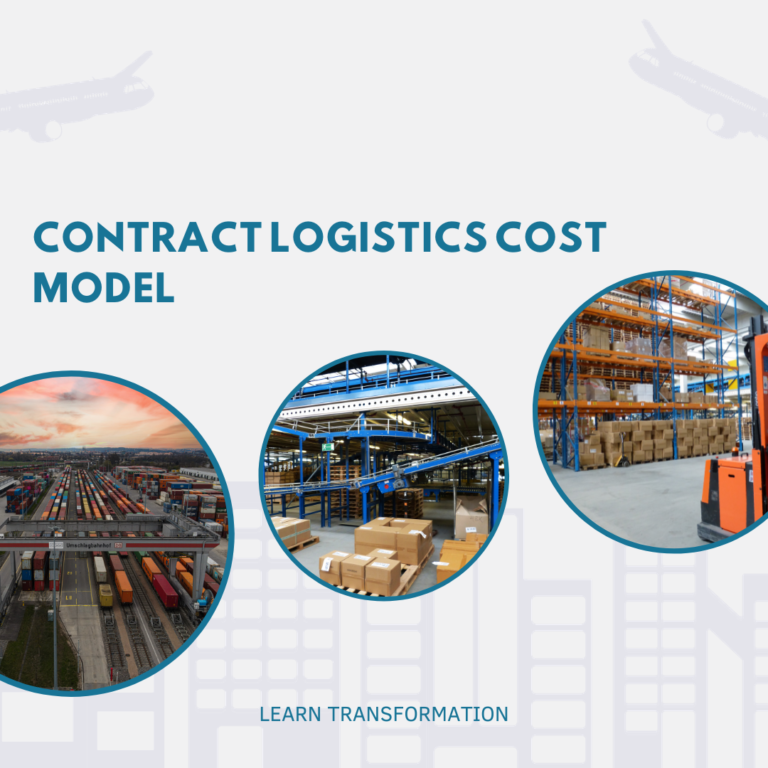Conversation with customers will increase sales, even if the product or service is never mentioned.
George Farris, founder of Farris Marketing
What is Contract Logistics Cost Model?
A contract logistics cost model helps both Logistics Service Providers (LSPs) and their customers to understand the cost structure and factors that affect the price of contract logistics solutions.
The exact components of a cost model will vary by service type and industry, but here are some important factors that are often considered for contract logistics cost model:
- Labor cost: This includes labor costs for various logistics activities such as warehousing, inventory management, order processing, transportation coordination and administrative operations.
- Setup fee: This includes costs associated with renting or owning storage facilities, such as rent, utilities, maintenance, security, insurance and equipment.
- Tech cost: This includes investments in warehouse management systems (WMS), transportation management systems (TMS), tracking tools, and other technology solutions needed to support efficient operations and data management.
The entire cost of moving a product, from obtaining raw materials to fulfilling client orders, is referred to as logistics costs.
Warehousing The business models use different costing methodologies. Dedicated and stand-alone facilities would utilize a different costing model than conventional shared warehouses, which may be worked up based on transaction costs.
- Utilities & Consumables
- Administrative expenses
- Overheads
- Profit / Management Fee
Successful supply chain management and effective logistics are essential in today’s fiercely competitive corporate environment. Thus, understanding and maximising contract logistics costs is a crucial part of good logistics management. Furthermore, this article delves into the details of a contract logistics cost model, giving you useful information on how it might improve your company’s operational efficiency, cut costs, and spur growth.

Knowledge of Contract Logistics
Let’s create a firm grasp of contract logistics before diving into the cost model. Furthermore, contract logistics refers to the contractual outsourcing of different logistics tasks to a third-party provider (3PL). These tasks may involve inventory management, distribution, transportation, and warehousing, among others.
The benefits of contract logistics include cost savings, scalability, and access to specialised knowledge. But in order to take full advantage of these advantages, a clear cost model must be in place.
Businesses can successfully analyse and control logistics costs with the aid of a standardised framework called a contract logistics cost model. It offers a thorough analysis of all expenses related to contracting out logistical work to a 3PL.
Also read: How Logistics 4.0 And Supply Chain 4.0 Will Increase Efficiency By 5x?
Why having a strong cost model is essential is as follows:
- Cost Transparency: It provides transparency into your logistics costs, enabling you to pinpoint cost factors and potential areas for cost reduction.
- Budgeting and Cost Forecasting: A cost model supports in planning for future costs and budgeting for logistics expenses, allowing you to deploy resources more efficiently.
- Utilising the model, you can evaluate the performance of your 3PL provider and make sure you get the most out of your investment.
- It is a useful tool for contract talks with 3PL providers and aids in establishing conditions that are advantageous to both parties.
Let’s now examine the elements and operation of a contract logistics cost model.
A Contract Logistics Cost Model’s Elements
A complete contract logistics cost model is made up of numerous components that cover every facet of outsourcing logistics. These elements consist of:
- Direct costs
- Expenditures associated with moving items, such as shipping, carrier fees, and fuel expenditures, are included in this category.
- Costs related with warehousing items, such as rent, utilities, labour, and equipment, are included here.
- charges associated with holding inventory, including as capital expenditures, insurance premiums, and handling charges, are covered here.
- Labour Costs: This category includes costs related to labour, such as salaries, benefits, and training.
2. Indirect Costs
- Indirect costs, such as rent for offices and utilities, classify overhead costs.
- IT and technological Costs: This category includes costs for technological infrastructure, data management, and logistics software.
- Costs Associated with Quality Assurance and Compliance: This category includes expenses related to quality assurance, compliance monitoring, and auditing.
3. Fixed and variable costs
- Variable costs are those that alter in accordance with modifications in logistical activity, such as transportation costs that change with the amount of shipments.
- Fixed costs, like the rent for a warehouse or the wages of permanent employees, are expenses that never change regardless of the logistics activity.
4. One-Time Costs: Implementation Costs
- Up-front expenses spent when switching to a 3PL supplier, such as system integration and training.
- Key Performance Indicators (KPIs) are performance metrics. You must assess performance using metrics such as on-time delivery, order accuracy, and inventory turnover.
Cost Model Development and Implementation
Developing and implementing a contract logistics cost model involves several crucial elements:
- Identify Cost Categories: To start, list all direct and indirect cost categories related to logistics outsourcing.
- Collect Information: Compile performance indicators and historical cost data from your present logistical operations.
- Assign Costs: Assign financial resources to particular logistical procedures and activities. Consider allocating labour costs to the transportation and warehousing processes.
- Pick performance indicators: Measure the success of your logistics operations by choosing pertinent KPIs that are consistent with your business objectives.
- Create cost modelling: Create cost models for each logistical task, taking into account past information and projected changes.
- Put the Model into Practise: Put the cost model into practise inside your organisation, making sure that all pertinent parties are aware of it and using it.
- Monitor and Adjust: Constantly keep an eye on expenses and performance indicators, adjusting as necessary to improve logistical operations.
Also read: Supply Chain 4.0 And Logistics 4.0 – The Major Difference
A Contract Logistics Cost Model’s Advantages
Using a contract logistics cost model has the following advantages:
- Cost Optimization: The model finds inefficiencies and enables better spending decisions.
- Informed Choices: Understand expenses for data-driven decisions aligned with goals.
- Performance Review: Assess 3PL providers using the model to ensure KPIs are met.
- Accurate Budgeting: Efficiently allocate budgets with precise cost estimates.
- Negotiating Power: A well-documented cost model strengthens contract negotiations.
- Monitoring costs and performance indicators frequently encourages a culture of continuous improvement, which improves productivity and customer happiness.
3 Best Logistics Books
Global Reader’s Click Below:
- Supply Chain Management For Dummies
- Value Stream Mapping: How to Visualize Work and Align Leadership for Organizational Transformation Hardcover
- The Toyota Way: 14 Management Principles from the World’s Greatest Manufacturer
India Reader’s Click below:
- Logistics and Supply Chain Management
- Supply Chain & Logistics Management-KL
- Operations, Logistics and Supply Chain Management (Lecture Notes in Logistics)
Conclusion
A Contract Logistics Cost Model is a useful tool that gives companies the ability to comprehend, manage, and optimise their logistics costs in the dynamic world of logistics and supply chain management. Thus, organisations may manage the difficulties of outsourcing logistical activities, promote cost-efficiency, and ultimately accomplish their growth goals by putting in place a structured cost model.
In summary, a well-designed cost model is vital for navigating logistics and supply chain management. It enables businesses to fully understand their logistical costs, make educated, data-driven decisions, and maximise cost effectiveness. The cost model drives long-term growth, finding savings, assessing performance, and aiding 3PL negotiations. Constant evaluation and improvement, along with precise budgeting, guarantee that logistics operations support strategic goals while maximising effectiveness and cost-savings. Further, understanding contract logistics cost modeling is vital for supply chain efficiency and cost savings in today’s dynamic business environment.
Key Takeaways
- In order to scale easily and save money, supply chain management requires outsourcing logistics to 3PLs.
- Transparency, budgeting, performance monitoring, and successful 3PL negotiations are all made possible by a contract logistics cost model.
- Direct and indirect costs, variable and fixed costs, implementation costs, and performance measurements are all included in the comprehensive cost model.
FAQs
What is contract logistics?
Contract logistics refers to the contractual outsourcing of different logistics tasks to a third-party provider (3PL). Additionally, these tasks may involve inventory management, distribution, transportation, and warehousing, among others.
The benefits of contract logistics include cost savings, scalability, and access to specialised knowledge. But in order to take full advantage of these advantages, a clear cost model must be in place.
Should logistics companies reform pricing?
Businesses can successfully analyse and control logistics costs with the aid of a standardised framework called a contract logistics cost model. It offers a thorough analysis of all expenses related to contracting out logistical work to a 3PL.
For exclusive content:

